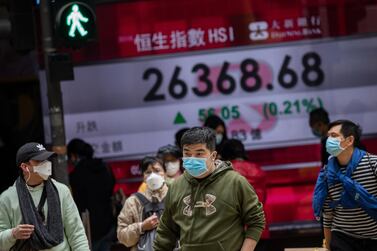Spillover effects from the novel coronavirus present a new risk to the global economy, the US Federal Reserve said in its latest monetary policy report.
The Fed said in a bi-annual report to the Congress that the global economy and the US could be further affected due to the Chinese economy's size.
"Downside risks to the US outlook seem to have receded in the latter part of the year, as the conflicts over trade policy diminished somewhat, economic growth abroad showed signs of stabilising, and financial conditions eased," the bank said.
"More recently, possible spillovers from the effects of the coronavirus in China have presented a new risk to the outlook," the report said.
The rapid spread of the virus, which has so far claimed 722 lives and infected around 35,000 people, brought China - the world's second-largest economy - to a virtual standstill as Beijing rushed to contain the epidemic by enforcing a lockdown on domestic travel.
As a result, the country's economy is expected to continue to slide, like in 2019 - which was primarily a consequence of its trade war with the US. China, which accounted for 20 per cent of global manufacturing output in 2018, is expected to see its annual gross domestic product slide to 5 per cent from 5.7 per cent due to the economic fallout from the virus, S&P Global Ratings predicts.
In a bid to boost its economy, China's government injected 1.2tn yuan (Dh635 billion) into financial markets last week, in addition to lowering interest rates on reverse repurchase agreements by 10 basis points.
Beijing also halved tariffs on $75bn worth of US goods as a result of a phase one trade deal with the US last month. Goods earlier taxed at 10 per cent will be levied a 5 per cent fee, while those having a tariff of 5 per cent will now have a 2.5 per cent duty from February 14 onwards. The US is also expected to reciprocate, rolling back some of its tariffs on Chinese goods.
The Fed also noted that the spillover from the coronavirus further weakened the outlook of Asian economies which have been hit by political unrest in Hong Kong, slow growth in India and trade tensions with the US.
While it was "premature" to speculate about the economic impact of the epidemic, China's economy will most certainly be affected in the first quarter, the International Monetary Fund's chief Kristalina Georgieva said last month.
“It would be irresponsible to offer any speculations around what may happen. What I can do is refer to a similar case of Severe Acute Respiratory Syndrome, [or] the SARS epidemics. What happened then was indeed a slow-down in the short term and then rebalancing of economic growth," she said.
SARS refers to a strain of coronavirus with similar origins in China that claimed 774 lives between 2002 and 2003.
Former IMF chief Christine Lagarde, who currently heads the European Central Bank, also cited the virus threat as a new risk to the economic outlook, replacing the US-China trade war.
“While the threat of a trade war between the US and China appears to have receded, the coronavirus adds a new layer of uncertainty,” Ms Lagarde said on Thursday.








